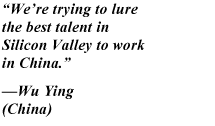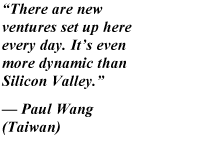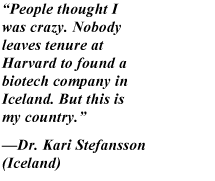

On its present course, America's nation of immigrants will become a nation of
emigrants. The reason? Countries from Iceland to India are launching bold initiatives
to lure top talent away from the United States. For more than five years, David
Heenan crisscrossed the globe-traveling to eight countries on three continents-to
study America's reverse brain drain. A leading expert on globalization and author of
Flight Capital (Davies-Black, $24.95), Heenan sat down for one-on-one interviews with
more than 100 top-flight repatriates-world-class leaders in science, technology, and
beyond. Among his findings in Asia, Europe and North America:
China
Yu shi ju jin. That's Chinese for, "Look out world, here we come." The country's
global ascent is helping the massive nation replace the United States as the
dominant economic power. To reverse decades of exodus, China is aggressively
wooing back its diaspora. From Shanghai to Guangzhou, local governments are
offering everything from Western-style salaries and benefits to free housing and
tax breaks. What's more, venture capitalists are providing plenty of money to
fund new ideas. In turn, China's best technology entrepreneurs are going home
or staying home to launch their powerful new start-ups. Among them are
repatriates Edward Tian, the founder of telecom giant China Netcom, and
Charles Zhang, the MIT-educated founder of Sohu.com, one of China's two
largest Web portals.
India
More than 5,000 seasoned, tech-savvy professionals have repatriated to India
from the United States in the last two years alone. According to the National
Association of Software and Service Companies, India's software trade
organization, many of them hold U.S. work visas and green cards-some are
even U.S. citizens. What's luring them back? For the most part, it's what
attracted foreign investors to the nation when it began to liberalize in the
1980s-a huge potential market in one of the world's fastest-growing economies,
coupled with vastly improved living standards.
Singapore
This tiny city-state-about the size of Rhode Island-has developed into one of
the world's great economic success stories. In the late 1990s, its government
created "Contact Singapore" to locate and poach global talent. With offices
located around the world, the agency means business. David Tan, the group's
Harvard-educated director, reports that his work has gotten a lot easier since
9/11-having quickly attracted some 30 leading scientists and professionals,
primarily because of safety and security concerns in the United States. Among
the highly prized recruits is Dr. Edison Tak-Ban Liu, a Stanford-trained superstar
who traded in his directorship at the U.S. National Cancer Institute to head the
Genome Institute of Singapore.
Taiwan
The world's largest manufacturer of desktop PCs and peripherals, Taiwan-
officially, the Republic of China-owes its economic miracle to the opening in the
late 1980s of Hsinchu Science Park, a sprawling Silicon Valley-inspired complex of
370 firms on a former tea plantation southwest of Taipei. Now the government's
Ministry of Economic Affairs is courting foreign and domestic companies to
establish cutting-edge R&D facilities in Taiwan. Today, some 65 R&D centers are in
operation on the island-far more than the initial goal of 40 by 2006. The
facilities employ more than 4,000 engineers, including 250 first-rate professionals
recruited from the U.S. and beyond.
Israel
Despite the financial burden of war and mass immigration, Israel has enjoyed
decades of relative prosperity, including last year's growth of about 2 percent.
What's more, the pint-size nation has arguably become the most important
spawning ground for science and technology companies outside of northern
California. Roughly 10 percent of the world's start-ups are here, while the
country ranks first in scientists and engineers as a percentage of the workforce.
Since the early 1990s, a string of Israeli leaders has sought to attract large
numbers of Israelis back home. The focus? The estimated 300,000 expatriates in
North America-many with much-needed scientific, technological, and
management know-how. Among a recent group of 1,500 pioneers is Yoram
Yahav, a Fortune 500 executive who returned to Israel to head the Technion
Institute of Management, a world-class business school designed to transform
Israeli entrepreneurs into disciplined, globally oriented managers.
Ireland
Ireland is on a mission with a massive development plan-costing some
$2 billion-aimed at bringing brainpower back to the Old Sod. One initiative is
Enterprise Ireland's "BioLink USA-Ireland," a series of stateside summits designed
to attract expatriates back to Ireland to create a first-rate biotechnology sector.
According to Enterprise Ireland's research, more than 75 percent of the targets-
some of America's most distinguished life scientists and researchers-report that
they want to return home within five years.
Iceland
Few Americans are aware that this small Arctic island is one of the world's five
richest countries per capita. Its most famous repatriate is Dr. Kari Stefannson, a
former Harvard Medical School professor with a driving ambition to turn
Iceland into the epicenter of genetic discovery. Co-founder of deCODE
Genetics, Stefannson has lured streams of brilliant Icelanders from Harvard and
MIT to remote Reykjavik. And thanks to state-of-the-art technology and the
special features of the Icelandic population, they're giving deCODE a substantial
lead in tracking down the variant genes in the world's most common diseases.
Mexico
Thanks to NAFTA, Mexico has gone from an economic lightweight to a Latin
heavyweight with the world's ninth largest economy. Up to 2 million jobs have
been created below the Rio Grande-many of them in Mexico's high-tech
corridor along the U.S. border-with President Vicente Fox now spearheading a
variety of programs to lure U.S. immigrants home for careers in business,
government, and academia. One of the country's most prominent repatriates is
Ana Maria Salazar, a Harvard Law grad who joined the U.S. Foreign Service and
ultimately served as Deputy Assistant Secretary of Defense. Four years ago,
Salazar returned to Mexico to work for a prestigious Mexico City think tank and
now hosts a television news program to inform outsiders about life in Mexico.
Additionally, more than a half-dozen repatriates recently ran for political office,
and seasoned IT pros such as Jorge Savala, the founder of six high-tech start-ups,
are working with Mexico's government to build a global IT industry.












